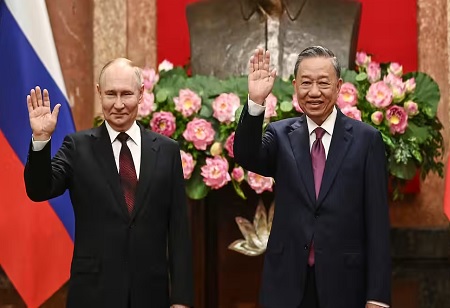
Putin Visits Vietnam to Boost Southeast Asia Relations Amid Isolation

 Russian President Vladimir Putin is focusing on bolstering relations with Vietnam during a state visit, a move coinciding with Moscow's increasing international isolation due to its military actions in Ukraine. Upon arriving in Southeast Asia, Putin received a warm welcome from dignitaries. His visit followed a stop in North Korea, where he and North Korean leader Kim Jong Un signed an agreement pledging mutual aid in potential wartime scenarios. This strategic pact signifies a significant strengthening of ties between Moscow and Pyongyang amid rising tensions with Western nations reminiscent of the Cold War era.
Russian President Vladimir Putin is focusing on bolstering relations with Vietnam during a state visit, a move coinciding with Moscow's increasing international isolation due to its military actions in Ukraine. Upon arriving in Southeast Asia, Putin received a warm welcome from dignitaries. His visit followed a stop in North Korea, where he and North Korean leader Kim Jong Un signed an agreement pledging mutual aid in potential wartime scenarios. This strategic pact signifies a significant strengthening of ties between Moscow and Pyongyang amid rising tensions with Western nations reminiscent of the Cold War era.
Putin arrived at Vietnam's Presidential Palace to a warm welcome from school children waving Russian and Vietnamese flags. He greeted Vietnam's new President To Lam with handshakes and embraces. The Russian leader's agenda also includes meetings with Communist Party General Secretary Nguyen Phu Trong, Vietnam's most influential political figure, along with other officials later on.
Much has changed since Putin’s last visit to Vietnam in 2017. Russia now faces a raft of U.S.-led sanctions for its invasion of Ukraine. In 2023, the International Criminal Court in Hague issued an arrest warrant for Putin for war crimes. The Kremlin rejected it as “null and void,” stressing that Moscow doesn’t recognize the court’s jurisdiction. Putin's recent visits to China and now North Korea and Vietnam are attempts to “break the international isolation,” said Nguyen Khac Giang, an analyst at Singapore’s ISEAS-Yusof Ishak Institute.
The U.S. and its allies have expressed growing concerns over a possible arms arrangement in which Pyongyang provides Moscow with badly needed munitions for its use in Ukraine in exchange for economic assistance and technology transfers that could enhance the threat posed by Kim’s nuclear weapons and missile program. Meanwhile, Giang said Russia is important to Vietnam for two reasons: It is the biggest supplier of military equipment to the Southeast Asian nation, and Russian oil exploration technologies help maintain its sovereignty claims in the contested South China Sea.
Hanoi and Moscow have maintained diplomatic relations since 1950, and this year commemorates three decades since the treaty establishing "friendly relations" between Vietnam and Russia was signed. As a robust manufacturing hub and a significant participant in global supply chains, Vietnam welcomed visits from U.S. President Joe Biden and Chinese leader Xi Jinping in 2023. Vietnam seeks U.S. support to propel its economic goals forward and broaden its defense partnerships.
In 2023, bilateral trade between Russia and Vietnam amounted to $3.6 billion, significantly lower than Vietnam's trade figures of $171 billion with China and $111 billion with the United States. Since the early 2000s, Russia has consistently supplied around 80% of Vietnam's arms imports. However, Vietnam has been reducing its reliance on Russian arms through efforts to diversify its sources. According to Giang, fully transitioning away from Russian arms will require a gradual process.

